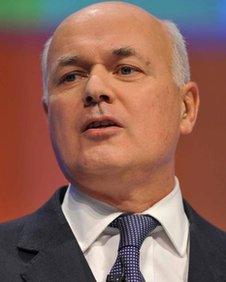Universal credit: Fortnightly benefits to stay for some
- Published

Iain Duncan Smith says there will be flexibility in the new arrangements
Some benefit claimants may be allowed to remain on fortnightly payments when a new benefit system is launched next year, ministers have said.
Under the new Universal Credit, all claimants are meant to receive monthly payments to help simplify the system.
But anti-poverty groups fear the move could harm the most vulnerable.
Ministers acknowledged some claimants may find it "difficult to cope" and could be allowed to keep fortnightly payments for an "interim" period.
The Universal Credit aims to simplify the benefits system and make work a more attractive option for claimants by replacing five work-based benefits with a single payment.
The scheme, devised by Work and Pensions Secretary Iain Duncan Smith, has been described by ministers as the most "radical redesign" of benefits in the history of the welfare state.
It has the backing of the Labour Party and many anti-poverty campaigners, who believe the existing system is too complex and does not reward work.
But some campaigners have questioned the transition to monthly payments, saying it will put acute pressure on people struggling to manage their finances.
'Difficult to cope'
Mr Duncan Smith defended the transition to monthly payments, telling MPs it would bring claimants "much more into line with the world of work".
But he added: "One of the great problems we've had is that when people go to work who have been unemployed, they find it very very difficult to cope with having to suddenly take on and manage their arrangements.
"So the key thing is those that can we want to get them there; and the others we will work with them. For some there may be interim two-weekly payments.
"We are looking at the moment to trial a whole series of arrangements to make that much easier for them and we'll make sure that happens."
He also confirmed that his department would offer training and support in managing family budgets for some claimants.
Business case
The announcements came ahead of a Commons debate on the Universal Credit on Tuesday, with Labour questioning how the far-reaching changes will be implemented and their final cost.
"It's quite clear the Treasury thinks there's a state of chaos around Universal Credit, the Cabinet Office thinks there's chaos, No 10 thinks there's chaos," shadow work and pensions secretary Liam Byrne told Mr Duncan Smith during departmental questions in the Commons.
"Surely it's time you told the House what is exactly going on and set before us the business case you're trying to keep secret."
The government have rejected suggestions that new computer systems to administer the Universal Credit will not be ready in time, saying most of them had already been built and were being tested.
The Universal Credit will replace jobseeker's allowance, tax credits, income support, employment and support allowance - formerly known as incapacity benefit - and housing benefits.
It will be "piloted" in parts of the north-east England next April and will come into force nationally for new claimants from October 2013. Existing claimants will be transferred to the new system in stages until 2017.
- Published9 September 2012
- Published9 September 2012